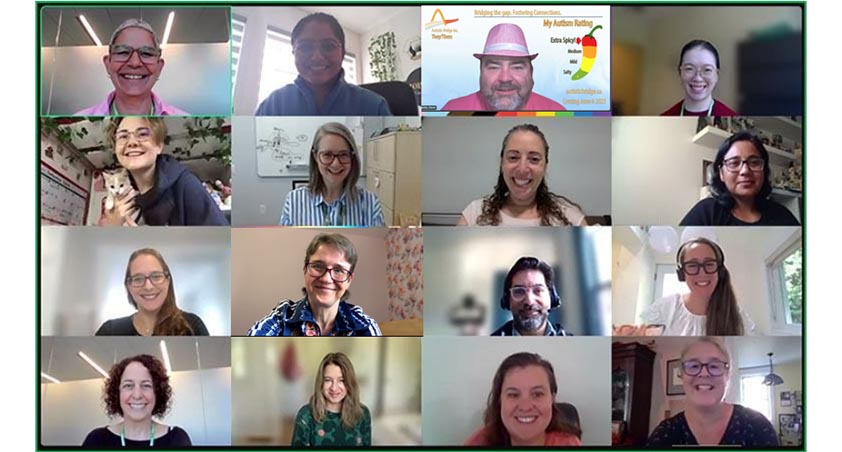
Program boosts confidence among community doctors and brings care closer to home
When community doctors receive expert advice on how to support autistic children, they are putting that knowledge into practice — and families are seeing the benefits.
A new study in the Journal of Autism and Developmental Disorders, titled Characterizing Project ECHO Autism Case Recommendations and Implementation, found that nearly three-quarters of recommendations from the ECHO Ontario Autism program were adopted in real-world care.
ECHO Ontario Autism, based at Holland Bloorview Kids Rehabilitation Hospital (Holland Bloorview), is a virtual program that connects community doctors with specialists in autism care. Through case discussions and mentoring, community pediatricians and family doctors gain knowledge, skills and confidence in diagnosing autism and supporting families.
Building capacity across Ontario
The study reviewed 289 recommendations provided through the program to physicians who presented patient cases. Of those, 74 per cent were implemented. Recommendations ranged from practical strategies — such as using noise-cancelling headphones for a child with sound sensitivity — to referrals for speech-language therapy or community programs, as well as guidance on supporting daily living skills and addressing co-occurring conditions.
The most common reason a recommendation was not followed was because families chose a different option or felt it wasn’t the right fit for them.
Dr. Melanie Penner, developmental pediatrician and senior clinician scientist in the Autism Research Centre (ARC) at the Bloorview Research Institute (BRI), Holland Bloorview, says the findings highlight the value of sharing expertise beyond hospital walls.
“Families often face long wait times and barriers to accessing autism services,” said Penner. “By equipping community providers with knowledge and practical recommendations, ECHO Ontario Autism helps bring high-quality care closer to home.”

Improving confidence and care
Doctors who took part in the program reported that the recommendations improved their confidence in diagnosing autism, broadened their understanding of community resources, and strengthened their relationships with families and colleagues.
Dr. Janet McMullen, a community pediatrician who participated in the program, said it has been invaluable for staying current and supported in her practice.
“Participating in the ECHO Ontario Autism program has enabled me to stay current with the latest resources and best practices in diagnostic and post-diagnostic care for autistic children,” said McMullen. “The program has helped me feel confident and supported in offering meaningful care that meets families where they are — in their own communities.”
Another participant, Dr. Nabeela Waja, a community pediatrician, noted that the program fosters collaboration and empowers providers to deliver timely, family-centred care.
“The ECHO Ontario Autism program is one that I would highly recommend to all my pediatric colleagues,” said Waja. “Throughout the program, I felt a sense of belonging to the ECHO community, which included developmental specialists, psychologists, allied workers and autistic team members. The knowledge and connections built through this experience created a positive and exciting learning opportunity. It empowered me to feel confident in diagnosing and supporting autistic individuals and their families, which has been reflected in the appreciation from my patients and their families for being able to access care closer to home.”
The benefits went beyond the individual cases discussed. Participants said what they learned through ECHO helped them support other children with similar needs in their practice.
Addressing gaps in autism services
Many families across Canada experience delays in accessing autism assessments and face challenges in finding ongoing supports. ECHO Ontario Autism was created to help address these gaps by building capacity in the health-care system and equipping more community providers to recognize and support autistic children and their families.
The program uses a virtual model first developed at the University of New Mexico. Through videoconferencing, local doctors present cases to a “Hub” of autism specialists, allied health professionals, autistic advocates and parent advisors. The group discusses the case and provides practical recommendations, which are later shared with all participants.
By building knowledge and creating a community of practice, ECHO Ontario Autism helps bring high-quality care closer to home, especially in regions where families may have less access to specialized services.
Penner says the study demonstrates how system-wide mentoring can make a tangible difference.
“This is about changing practice at the point of care,” she said. “When community providers feel supported, families get timely care, and our health system becomes stronger.”
The research also points to areas for improvement. Some recommendations were not followed because of systemic barriers such as lack of local services, time constraints or language and financial challenges faced by families. Penner notes that understanding these barriers will help refine the program and ensure recommendations are realistic and family-centred.
Funded by the Ontario Ministry of Health, ECHO Ontario Autism is free for physicians and nurse practitioners across the province. Since launching, it has trained more than 600 providers.
The study was authored by Catherine Bosyj, Lisa Kanigsberg, Anmol Patel, Salina Eldon, Jessica Brian and Melanie Penner. The authors hope the findings will encourage the continued growth of ECHO programs as a way to reduce wait times and improve care for autistic children and their families.
Read the full study: Journal of Autism and Developmental Disorders
Learn more about the ECHO Ontario Autism program at Holland Bloorview: ECHO Ontario Autism
By Priyanka Shah